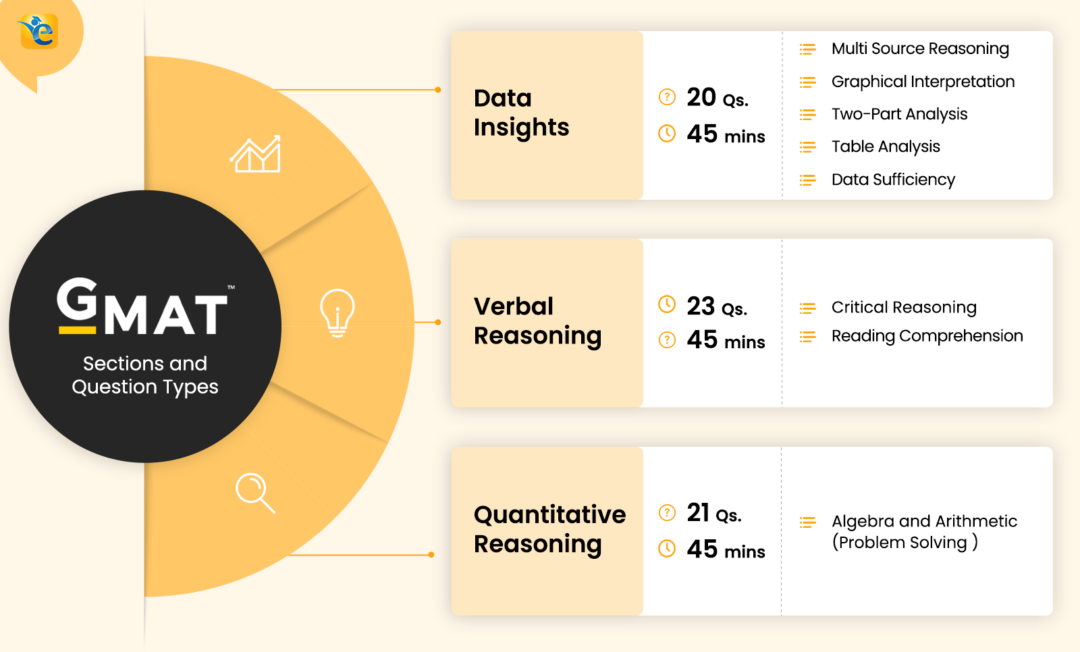Are you aware of the latest GMAT Syllabus?
- 1 GMAT syllabus for 2024
- 1.1 1. Overview of the GMAT Exam Structure
- 1.2 2. Analytical Writing Assessment (AWA)
- 1.3 3. Integrated Reasoning (IR)
- 1.4 4. Quantitative Reasoning
- 1.5 5. Verbal Reasoning
- 1.6 6. Scoring and Test-Taking Strategies
- 1.7 7. Preparing for the GMAT: Study Resources and Tips
- 1.8 8. Staying Updated with GMAT Changes
- 1.9 Conclusion
- 1.10 References
The Graduate Management Admission Test (GMAT) is a standardized exam that plays a crucial role in the admissions process for many business schools worldwide. As a measure of skills necessary for academic success in graduate business programs, the GMAT assesses analytical, writing, quantitative, verbal, and reading skills. With the ever-evolving nature of education and testing methodologies, staying abreast of the latest GMAT syllabus is essential for prospective test-takers.
GMAT syllabus for 2024

This article provides a detailed overview of the GMAT syllabus for 2024, aiming to equip candidates with the knowledge required to excel.
1. Overview of the GMAT Exam Structure
The GMAT exam consists of four main sections:
- Analytical Writing Assessment (AWA)
- Integrated Reasoning (IR)
- Quantitative Reasoning
- Verbal Reasoning
Each section is designed to test different aspects of a candidate’s analytical and reasoning abilities. Understanding the structure and content of these sections is the first step towards effective preparation.
2. Analytical Writing Assessment (AWA)
Duration: 30 minutes
Score Range: 0-6
Objective: The AWA measures the candidate’s ability to think critically and communicate ideas effectively through writing. Test-takers are required to analyze an argument and critique its reasoning.
Key Areas to Focus:
- Understanding Argument Structure: Identify assumptions, evaluate evidence, and recognize flaws in arguments.
- Effective Communication: Develop a coherent and logically structured essay.
- Critical Thinking: Present an in-depth analysis and support your critique with relevant examples.
Preparation Tips:
- Practice writing essays on diverse topics.
- Focus on clarity, coherence, and grammatical accuracy.
- Review high-scoring sample essays to understand the evaluation criteria.
3. Integrated Reasoning (IR)
Duration: 30 minutes
Score Range: 1-8
Objective: The IR section evaluates the ability to analyze and interpret data from multiple sources and formats, including tables, graphs, and text.
Key Question Types:
- Multi-Source Reasoning: Analyze information from different sources to answer questions.
- Table Analysis: Interpret and sort data presented in tabular form.
- Graphics Interpretation: Analyze information presented in graphical formats.
- Two-Part Analysis: Solve complex problems that require simultaneous analysis of two aspects.
Preparation Tips:
- Familiarize yourself with interpreting diverse data formats.
- Practice integrating information from various sources.
- Develop skills to solve problems efficiently within the time limit.
4. Quantitative Reasoning
Duration: 62 minutes
Score Range: 6-51
Objective: This section assesses the ability to reason quantitatively, solve quantitative problems, and interpret graphic data.
Key Areas:
- Problem Solving: Test mathematical skills and logical reasoning.
- Data Sufficiency: Evaluate the ability to analyze a quantitative problem and determine if enough information is provided to solve it.
Quantitative Topics Covered:
- Arithmetic: Properties of integers, fractions, decimals, ratios, percentages.
- Algebra: Equations, inequalities, functions, quadratic equations.
- Geometry: Lines, angles, triangles, circles, polygons, coordinate geometry.
- Word Problems: Rates, work, mixtures, interest, profit and loss.
Preparation Tips:
- Strengthen fundamental mathematical concepts.
- Practice a wide range of problems to enhance problem-solving skills.
- Develop strategies for data sufficiency questions to determine the minimum information required.
5. Verbal Reasoning
Duration: 65 minutes
Score Range: 6-51
Objective: The Verbal section measures the ability to read and understand written material, evaluate arguments, and correct written material to conform to standard written English.
Key Areas:
- Reading Comprehension: Understand and analyze written passages.
- Critical Reasoning: Evaluate and critique arguments.
- Sentence Correction: Correct sentences to ensure proper grammar, style, and meaning.
Preparation Tips:
- Enhance reading skills by engaging with complex texts across different subjects.
- Practice critical reasoning by analyzing arguments and identifying logical flaws.
- Review grammar rules and practice sentence correction exercises.
6. Scoring and Test-Taking Strategies
The GMAT scores range from 200 to 800, combining the scores of the Quantitative and Verbal sections. The AWA and IR scores are reported separately. Understanding the scoring mechanism and implementing effective test-taking strategies can significantly impact performance.
Key Strategies:
- Time Management: Allocate time wisely across sections and avoid spending too much time on difficult questions.
- Practice Tests: Regularly take full-length practice tests to build stamina and get accustomed to the test format.
- Review and Analyze: Thoroughly review incorrect answers to understand mistakes and improve.
7. Preparing for the GMAT: Study Resources and Tips
Effective preparation for the GMAT involves a combination of understanding the syllabus, practicing consistently, and utilizing quality study resources. Here are some recommendations:
Study Materials:
- Official GMAT Guide: Provides authentic practice questions and test-taking strategies.
- Online Platforms: Utilize online resources such as GMAT Club, Manhattan Prep, and Magoosh for practice questions and tutorials.
- Prep Courses: Consider enrolling in a prep course if you prefer structured guidance.
Preparation Tips:
- Create a Study Plan: Develop a realistic study schedule that covers all sections of the syllabus.
- Practice Regularly: Solve practice questions daily to reinforce concepts and improve speed.
- Seek Feedback: Engage in study groups or seek feedback from mentors to identify areas of improvement.
8. Staying Updated with GMAT Changes
The GMAT syllabus and format may undergo changes periodically. Staying updated with the latest developments ensures that your preparation aligns with the current requirements.
Key Resources for Updates:
- GMAT Official Website: Regularly check for announcements and updates regarding the exam.
- Business School Forums: Engage with forums and communities to stay informed about any changes in the GMAT structure or syllabus.
Conclusion
The GMAT is a pivotal step in the journey to securing admission to top business schools. A comprehensive understanding of the latest GMAT syllabus for 2024, coupled with strategic preparation, can significantly enhance your chances of achieving a high score. Focus on mastering each section, utilize quality study materials, and stay updated with any changes to the exam format. With dedication and systematic preparation, you can approach the GMAT with confidence and succeed in your pursuit of graduate business education.
References
- Graduate Management Admission Council. (2024). GMAT Official Website.
- Manhattan Prep. (2024). GMAT Study Resources.
- Magoosh. (2024). GMAT Prep Blog.

















